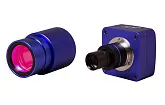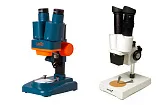How does the aperture of a microscope objective lens work?
An objective lens is a part of the microscope optical system that forms an enlarged image. When buying an additional objective lens, users usually pay attention to its magnification power because it has a direct impact on the magnification of the optical tool. One more specification that should be considered when choosing this accessory is the numerical aperture of the microscope objective lens.
In order to learn what this parameter means, take a look at the objective lens shell. It should say something like “100/1.25 oil 160/0.17”. It is interpreted as follows:
- “100” stands for objective lens magnification, i.e. 100x;
- “1.25” stands for the objective lens aperture (numerical aperture);
- “oil” stands for oil immersion (suitable for observations with oil immersion);
- “160” stands for the tube length (mm);
- “0.17” stands for thickness of a compatible cover slip (mm).
These numbers can vary from model to model, but their order remains the same. The magnification of the objective lens is shown first and then the aperture (after a slash). We emphasize that we mean the numerical aperture (the angular aperture is not marked anywhere). The numerical and angular apertures are connected by a complicated mathematical formula.
What is the numerical aperture of a microscope (objective lens)? That value says what resolution power a microscope will have while using a particular objective lens. The larger the numerical aperture, the tinier the details can be that a microscope can deliver sharply. Let’s take two objective lenses: 40/0.65 and 40/1.3. Both accessories feature equal magnification of 40x, but we will observe a sharper image while using an objective lens with a 1.3 aperture. We will be able to study even fine nuances of microstructures and more differences between closely placed elements of specimens. Roughly, a 40/0.65 objective lens delivers a blurrier image than a 40/1.3 objective lens. Note that the numerical aperture value is less significant at low magnifications. It should be taken into account only when choosing an objective lens with 40x magnification and higher.
Our online store offers an ample selection of reliable microscopes for precise and comfortable studying the microscope slides. Explore the micro world with quality optical tools!
Any reproduction of the material for public publication in any information medium and in any format is prohibited. You can refer to this article with active link to levenhuk.com.
The manufacturer reserves the right to make changes to the pricing, product range and specifications or discontinue products without prior notice.



